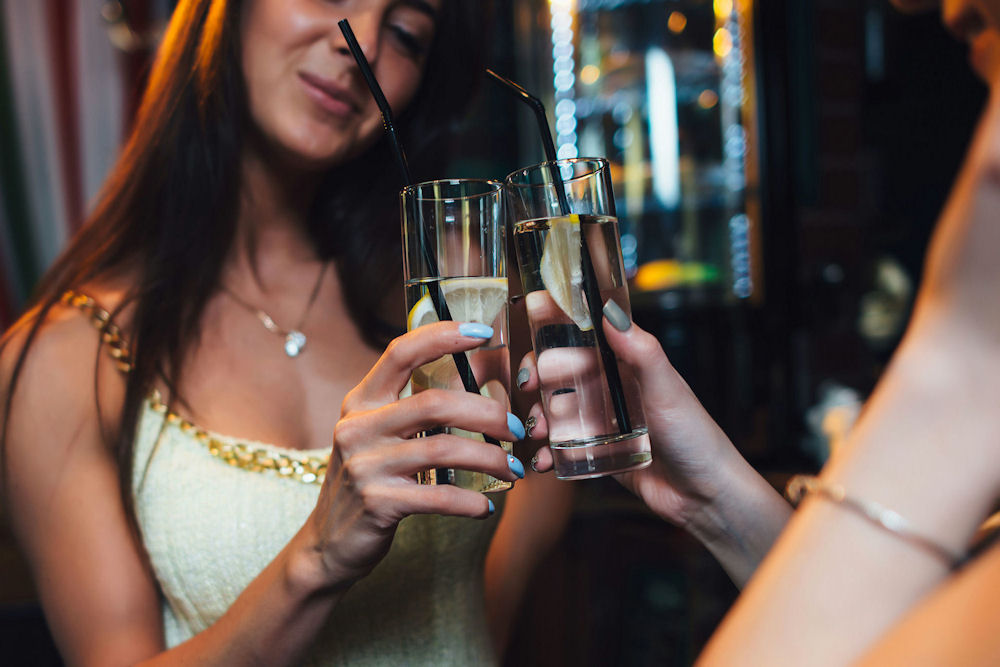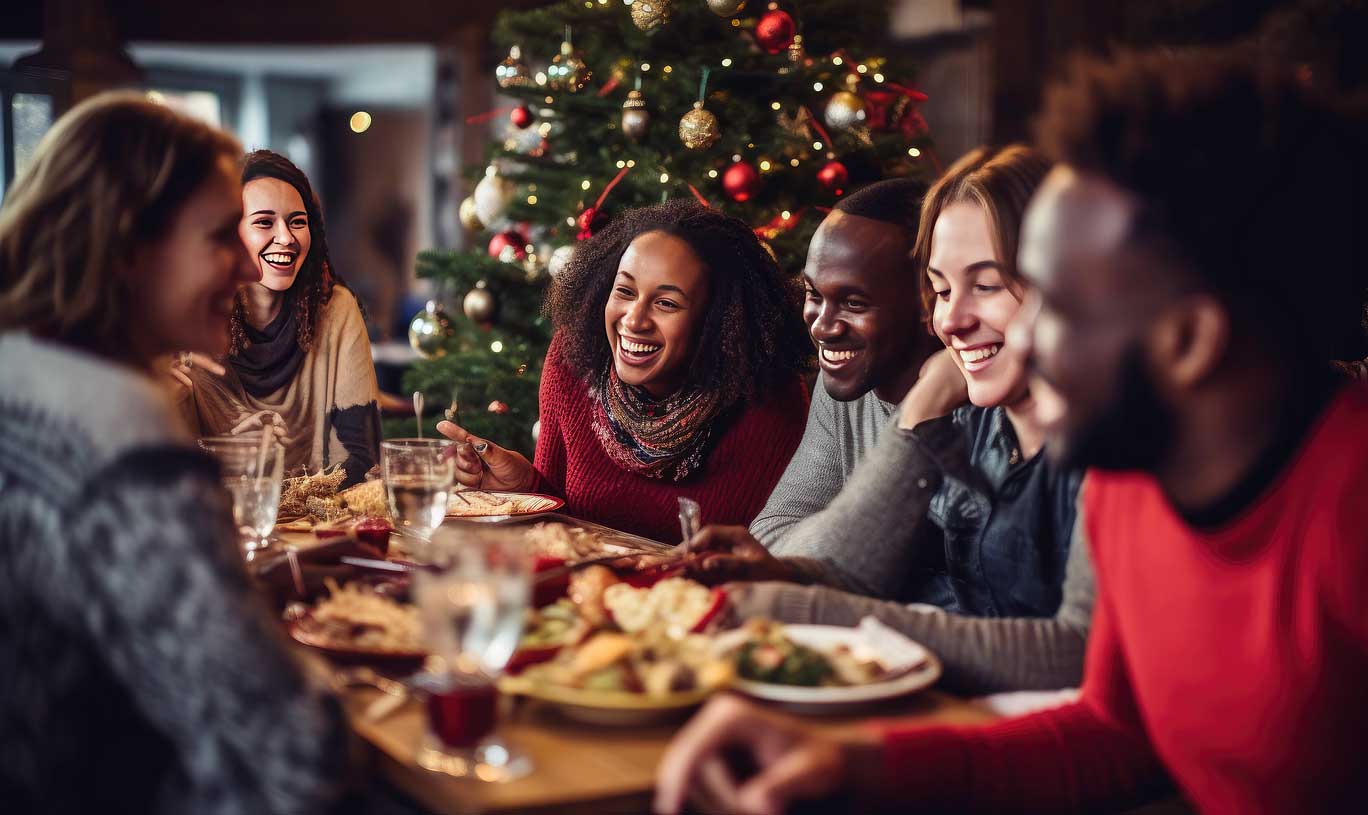Staying sober is a year-round challenge for many people in addiction recovery. However, certain times of the year and particular occasions are heavily associated with substance use—namely drinking alcohol.
At Free by the Sea, we understand that the holidays can be a challenging and triggering time for individuals in recovery. On the other hand, being prepared with strategies can greatly increase the probability that you do not relapse. That’s why we’ve put together this guide to assist with staying sober during the holidays.
Why is it Hard to Stay Sober During the Holidays?
Jump to Section
The holiday season is often associated with excessive drinking and partying and poses significant challenges for those undergoing alcohol addiction treatment. It can seem impossible to escape the slew of holiday-inspired cocktails, champagne toasts, and temptations to drink.
It can be difficult to avoid alcohol when attending a number of social events. These social events can include both family gatherings or work parties, which usually involve alcohol. Many people who drink use alcohol as a social lubricant. For those who have social anxiety, a drink may be their go-to way to relax in social settings. For others, alcohol may be part of traditional family celebrations and holiday rituals.
Moreover, the holidays can also bring up difficult emotions such as stress, loneliness, anxiety, and grief. These emotions can trigger the desire to turn to alcohol or drugs for temporary relief. The pressures of gift-giving, hosting guests, and family dynamics can be overwhelming. In these moments, it may feel tempting to turn to substances as a coping mechanism.
The Importance of Stay Sober During the Holidays

While there may be many reasons to want to drink, there are equally as many reasons not to. Staying sober during the holidays is an essential part of maintaining your recovery journey. Life after addiction treatment is not without triggers and temptations. By not drinking during the holidays, you are overcoming and surpassing another critical time in the recovery process.
Relapse can be extremely detrimental to your physical and mental well-being, as well as jeopardizing any progress you may have made in your recovery. Therefore, it’s important to have a solid plan in place to help you navigate through the holiday season without compromising your sobriety.
Furthermore, it’s important to remember that staying sober doesn’t mean missing out on all the holiday fun. Staying sober during the holidays also allows for a more meaningful and authentic experience. Instead of relying on substances to numb difficult emotions, you can fully engage with your surroundings and loved ones. This is an opportunity to create new traditions, participate in sober activities, and make memories that are rooted in sobriety.
Tips for Staying Sober During the Holidays
At Free by the Sea, we want to empower people in recovery with information and resources to help them stay sober during the holidays. Here are some tips to consider if you are wondering how to stay sober during the holidays:
Maintain Your Routine
The holidays can often disrupt our daily routines, but it’s important to try to stick to your regular routine as much as possible. This includes eating well, getting enough rest and exercise, and attending support group meetings. These habits help maintain a sense of stability and structure in your life.
Have a Plan
Before attending any holiday event, make sure you have a plan in place to help you stick to your goal of staying sober during the holidays. This plan can include the following:
- Bring your own non-alcoholic beverages so you have something to hold
- Drive yourself to holiday events to hold yourself accountable
- Recognize when you are experiencing triggering emotions such as loneliness, anger, or anxiety
- Have an exit strategy if things become overwhelming
- Identify a supportive friend or family member who can help keep you accountable
- Arrive early to events and leave early
- Rehearse how you will turn down substances
- Have a plan for how to address people who try to pressure you to drink
Additionally, it’s important to have a plan for how to handle potential triggers. This could include avoiding certain situations or people, having coping strategies in place, and practicing mindfulness techniques.
Attend Sober Events
Staying sober during the holidays is a whole lot easier when there are no substances or substance abuse around you. Instead of attending events where alcohol will be present, consider seeking out sober activities during the holidays. This could include attending a holiday concert or play, volunteering at a charity event, or hosting a sober gathering with friends and family.
Recovery doesn’t mean that you celebrate any less. Instead, it’s an opportunity to celebrate in a different, more meaningful way. Rather than getting intoxicated at holiday events, you will have the opportunity to create new traditions.
Limit Time with Your Triggers
Triggers can get in the way of staying sober during the holidays. It’s an unfortunate reality that many people find spending time with their family triggering. The holidays present an obligation to spend time with family that many choose not to avoid. While you may want to spend time with your family, it is reasonable to limit your exposure to triggering family members.
If this is the case for you, consider limiting the amount of time you spend with family or setting boundaries beforehand. If you know that your mom or uncle becomes more difficult to be around after a few hours, you can come prepared with an excuse to leave early. You could also plan to attend holiday events with a supportive friend or loved one who can help keep you grounded in your sobriety goals.
Lean on Your Support System
The holiday season can be tough, but you don’t have to go through it alone. Reach out to your support system for help and guidance when needed can help with staying sober during the holidays. This could include attending recovery meetings, talking to a therapist or sponsor, or simply spending time with friends and family who support your sobriety.
Bringing a sober plus one to events can also be a helpful way to stay accountable and have someone who understands the challenges of staying sober during the holidays. Instead of going to your work holiday party or family’s home alone, bring a sober friend or family member who can provide support and encouragement.
Create Manageable Goals
Creating manageable goals is another act that supports staying sober during the holidays. Instead of setting unrealistic expectations for yourself during the holidays, focus on creating manageable goals that align with your recovery journey. This could include:
- Attending a certain number of support group meetings
- Volunteering at a local charity
- Practicing self-care activities
By creating and achieving manageable goals, you can feel a sense of accomplishment and continue to build your confidence in your recovery journey
Take Care of Yourself
Self-care is crucial during the holidays. Make sure to prioritize your physical and mental health by getting enough rest, eating well, and practicing self-compassion. Avoid taking on too many responsibilities or overcommitting yourself. Remember that it’s okay to say no if something doesn’t align with your sobriety goals.
Often, relapse is the result of unmitigated stress. By taking care of yourself, you are better equipped to handle the pressures and challenges of the holiday season without turning to substances. Instead of turning to drugs or alcohol to numb your pain, you will be better prepared to tackle it head-on.
Dealing with a Relapse
Despite being prepared, there are times when relapse happens. It’s essential to remember that relapse is not a sign of failure, but rather an opportunity to learn and grow. Don’t let one slip-up ruin all the progress you have made.
If you do experience a relapse, it’s crucial to seek help and support immediately. Reach out to your sponsor, therapist, or recovery group for guidance and support. It’s also important to reflect on what triggered the relapse and make adjustments to your relapse prevention plan to prevent future slip-ups.
The Importance of a Relapse Prevention Plan
A relapse prevention plan is a crucial tool in staying sober during the holidays. This plan should include strategies for managing triggers, identifying supportive resources, and creating a healthy support system. It’s essential to regularly review and update your relapse prevention plan to ensure it aligns with your current needs and challenges.
A relapse prevention plan is generally made with the help of a therapist or sponsor, but it can also be created independently. It should include a list of your triggers and cravings, strategies for you to manage cravings, preventative tools, recovery programs, and what you’ll do if you relapse.
Staying Sober During the Holidays with Free by the Sea

As mentioned before, having a solid relapse prevention plan is crucial for staying sober during the holidays. This plan should include strategies for handling triggers, coping with stress, and seeking support when needed. It’s also essential to regularly review and update your plan as needed.
At Free by the Sea, we offer relapse prevention planning services to help individuals in recovery stay on track during the holidays and beyond. Our compassionate and knowledgeable staff can work with you to create a personalized plan that meets your specific needs and goals.
To learn more about our relapse prevention services and other resources for staying sober during the holidays, please visit our website or contact us directly. Remember, you are not alone in your journey to sobriety, especially during the holiday season. With proper planning and support, you can have a peaceful and joyous celebration while staying true to your recovery goals.

Dr. Richard Crabbe joined our team in 2019 as our psychiatrist and medical director. He attended the University of Ghana Medical School where he became a Medical Doctor in 1977. From 1978 through 1984, he was a medical officer in the Ghana Navy and provided a variety of services from general medicine to surgeries. He received his Certificate in General Psychology from the American Board of Psychology and Neurology in 2002.

 December 4th, 2023
December 4th, 2023










